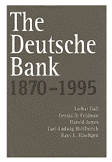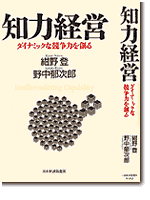The 1995 Financial Times/Booz Allen & Hamilton Global Business Book Awards
(originally published by Booz & Company)Thomas Sowell, the controversial American economist and scholar at the Hoover Institute at Stanford University, wrote some years ago, in "Knowledge and Decisions," that "ideas are everywhere, but knowledge is rare."
This is certainly the case when it comes to business and it is especially true when it comes to business books. Although thousands of idea-laden books make their way into print each year—and even onto the world's best-seller lists—only a handful are insightful enough to change the way people think and conduct their affairs.
Though wandering through the world's bookstores in search of wondrous new insights may certainly be one of life's pleasures, Booz-Allen & Hamilton and the Financial Times wanted to make the pursuit of knowledge more than just a random stroll. To call attention to the best ideas in business, Booz-Allen and the Financial Times jointly devised the Global Business Book Awards to honor the best business books published each year.
The aim of the 1995 awards was to find and recognize the top two books. To do that, Booz-Allen and the Financial Times organized regional panels of readers—business scholars, researchers and journalists—for the Americas, Europe and Asia-Pacific. Each of these panels read dozens of new books—147 were nominated for the 1995 awards—that were submitted by trade and academic publishers in their regions. The readers' mandate was simply this: to identify the top books in each region, by ranking them in a number of different ways but with the common goal of finding works that contain real insights.
The readers finished their assignments by delivering a "short list" of books for each region. Interestingly, most of the books that made it to this point focused on the so-called softer business issues. For example, 18 percent dealt with organizational dynamics, 10 percent focused on leadership, 9 percent explored the realm of knowledge, 6 percent were about teams. Most of these finalists—85 percent—were pragmatic and offered practical advice. Few of the books offered new theories about business.
When the regional short lists were in place, a prestigious group of judges took over. The judges—all of whom were business leaders or academicians—debated the merits of the finalists and selected regional winners in two categories: the Best Book About Business and the Best Management Book.
The winners in each region were then put forward for the Financial Times/ Booz-Allen & Hamilton Global Business Book Awards.
Edwin L. Artzt, chairman of the executive committee of the board, Procter & Gamble (United States), served as chairman of the global judges panel. The 14 other judges were Euan Baird, chairman, Schlumberger Ltd. (United States); John Baker, chairman, National Power (Britain); Antonio Borges, dean, INSEAD (France); Kazuo Chiba, former Japanese Ambassador to Britain (Japan); Brian Dickie, president, Worldwide Commercial Business, Booz-Allen & Hamilton (United States); Dr. Raffaele Esposito, president and chief executive, FIAR S.p.A. (Italy); Robert Hamada, dean, Graduate School of Business, University of Chicago (United States); Philippe Kahn, chairman, Starfish Software (United States); Richard Lambert, editor, Financial Times (Britain); Francis Lorentz, professor, Paris-Dauphine University (France); Rafael Páez, former chief executive, Grupo ALFA S.A. (Mexico); Helmut Ricke, former chairman, Deutsche Telekom A.G. (Germany); Gerhard Schulmeyer, president and chief executive, Siemens Nixdorf (Germany), and Ivan Seidenberg, chairman and chief executive, Nynex (United States).
After considerable deliberation, the judges chose the following books as winners of the 1995 Global Business Book Awards: Intellectualizing Capability, by Noboru Konno and Ikujiro Nonaka, and The Deutsche Bank: 1870–1995, by Lothar Gall, Gerald D. Feldman, Harold James, Carl-Ludwig Holtfrerich and Hans E. Büschgen.
The awards were presented at a ceremony in London in April 1996.
 BEST BOOK ABOUT BUSINESS
BEST BOOK ABOUT BUSINESS
The Deutsche Bank: 1870–1995
by Lothar Gall, Gerald D. Feldman, Harold James, Carl-Ludwig Holtfrerich and Hans E. Büschgen
(946 pages, published in German by C.H. Beck and in English by Weidenfeld & Nicholson)
This is not only an impressive book, well researched and well written (the translation into English is beautifully done), it is also exhaustive. The five co-authors, all of whom are professors at top universities in the United States and Germany, have produced more than a simple history of the Deutsche Bank.
They have divided their story into five periods: from the bank's inception, during the Bismarck years, to the Great War, 1870 to 1914; from the end of the Great War through the world's first global economic collapse, 1914-1933; from the beginning of the Nazi dictatorship to the end of World War II, 1933-1945; from the end of World War II through Germany's resurgence, 1945-1957; and, finally, the period of the rise of the Deutsche Bank as a global financial powerhouse, from 1957 to 1995.
Each section of the book is written by a different professor who is a specialist in the economic history of the time. The style is serious and analytical but this large and imposing work never makes a reader feel bogged down; all of the authors' contributions are written in a naturally flowing narrative form.
When this book first came out, there was controversy over its treatment of the Nazi period, as one might expect. But while it is straightforward in its account of the bank's role in helping to finance the Nazi dictatorship, it also takes great pains to show that senior staff members, up to the level of the board of directors, were divided in how they thought the bank should respond during the Hitler era. The book also recounts that while the bank had its own significant contingent of Nazis, it also had its share of German resistance fighters.
Though controversial in its assessment of the World War II years (some commentators in Germany viewed it as too soft while others as unduly harsh), this is an excellent work of history. It is written without compromise and without pulling punches. It is an extremely valuable account of how the single most important private financial institution in Germany helped that country develop its own form of capitalism. It is also a valuable account of how that same institution worked in concert with the Government and international institutions and banks and with foreign and domestic businesses to engineer Germany's economic resurgence during the "miracle years."
Not only is this book breathtaking in its scope, it also gives readers deep insights into how the mighty German economy was built, from Bismarck's nationalistic era to the current global period of B.M.W., Daimler-Benz, Siemens and the autobahn.
 BEST MANAGEMENT BOOK
BEST MANAGEMENT BOOK
Intellectualizing Capability
by Noboru Konno and Ikujiro Nonaka
(362 pages, published in Japanese only by Nippon Keizai Shimbunsha Publishing)
What really makes a company competitive?
According to Noboru Konno and Ikujiro Nonaka, it takes a combination of knowledge and creativity, which the authors term—in a rough translation from the Japanese—intellectual capability. Intellectual capability, what it is and how to develop it, is the subject of this book.
But more than presenting these concepts as a disconnected group of ideas, the authors develop them into a comprehensive body of knowledge, which includes theory, methodology, measurement and a description of the infrastructure necessary for putting a company's intellectual capabilities to work. As such, the concepts contained in "Intellectualizing Capability," like the core-competency notions of C.K. Prahalad or the analysis of dysfunctional measures by Robert Kaplan, are not simply descriptive, they are actionable.
So far, Intellectualizing Capability is available only in Japanese. This, along with its use of case studies taken almost entirely from Japanese companies, is its principal weakness. Even so, the ideas contained within the book deserve a wide, global audience. They affirm and describe what many leading-edge companies have come to believe—that ideas, correctly applied, are the competitive weapons of the future. ![]()
| Authors
Charles E. Lucier (lucier_charles@bah.com) is a senior vice president and the chief growth officer of Booz Allen Hamilton. His client work focuses on strategy and knowledge issues for consumer products and health companies. |


